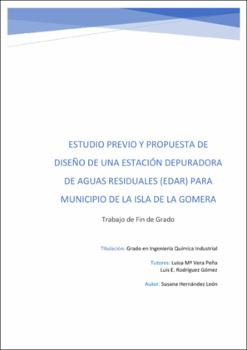Estudio previo y propuesta de diseño de una estación depuradora de aguas residuales (EDAR) para la isla de La Gomera.
Autor
Hernández León, SusanaFecha
2021Resumen
Para mejorar la calidad del efluente de salida de la EDAR convencional del casco del
municipio de Hermigua, se ha decidido recurrir a alternativas de depuración natural, ya que
son sistemas de bajo coste y se adapta a las necesidades de dicho pueblo, pues, al tratarse
de una isla menor, hay baja población lo cual es indispensable cuando se habla de
tecnologías extensivas.
Concretamente, se ha estudiado que el diseño de un humedal artificial de flujo
subsuperficial horizontal podría tratarse de una solución absolutamente viable y al dividirlo
en dos celdas en serie se logra optimizar el espacio y poder parar una de las celdas por si
fuera necesario para su mantenimiento. De este modo, se podrá cumplir la normativa
canaria medioambiental de vertido al mar sin ningún problema.
Asimismo, como el municipio es bastante disperso, hay barrios alejados que no están
conectados a la red de saneamiento y por ello, se ha estudiado el diseño de fosas sépticas
con disposición enterrada con el fin de evitar impactos sonoros o visuales, ya que dichas
zonas dispersas donde existen núcleos urbanos se encuentran en las proximidades del
Parque Nacional de Garajonay. Forimproving the quality of the effluentfrom the conventional Wastewater Treatment Plant
(WWTP) in the town of Hermigua, it has been decided to use natural treatment alternatives,
considering that they are low-cost systems and suit to the needs of that town because it is
a small island, there is a low population, which is essential when talking about extensive
technologies.
Specifically, it has been studied that the design of horizontal subsurface flow wetland
(HSSFW) could be an absolutely viable solution and dividing itinto two cellsin series in order
to optimize space and to be able to stop one of them if was necessary fortheir maintenance.
In this way, the Canary Islands environmental regulations on discharges into the sea can be
followed without any problem.
Likewise, as the municipality is quite dispersed, there are remote neighbourhoods that are
not connected to the sanitation network and therefore, the design of septic tanks with a
buried arrangement has been studied in order to avoid noise and visual impacts due to these
remote areas where there are urban areas are located in the vicinity of the Garajonay
National Park.





